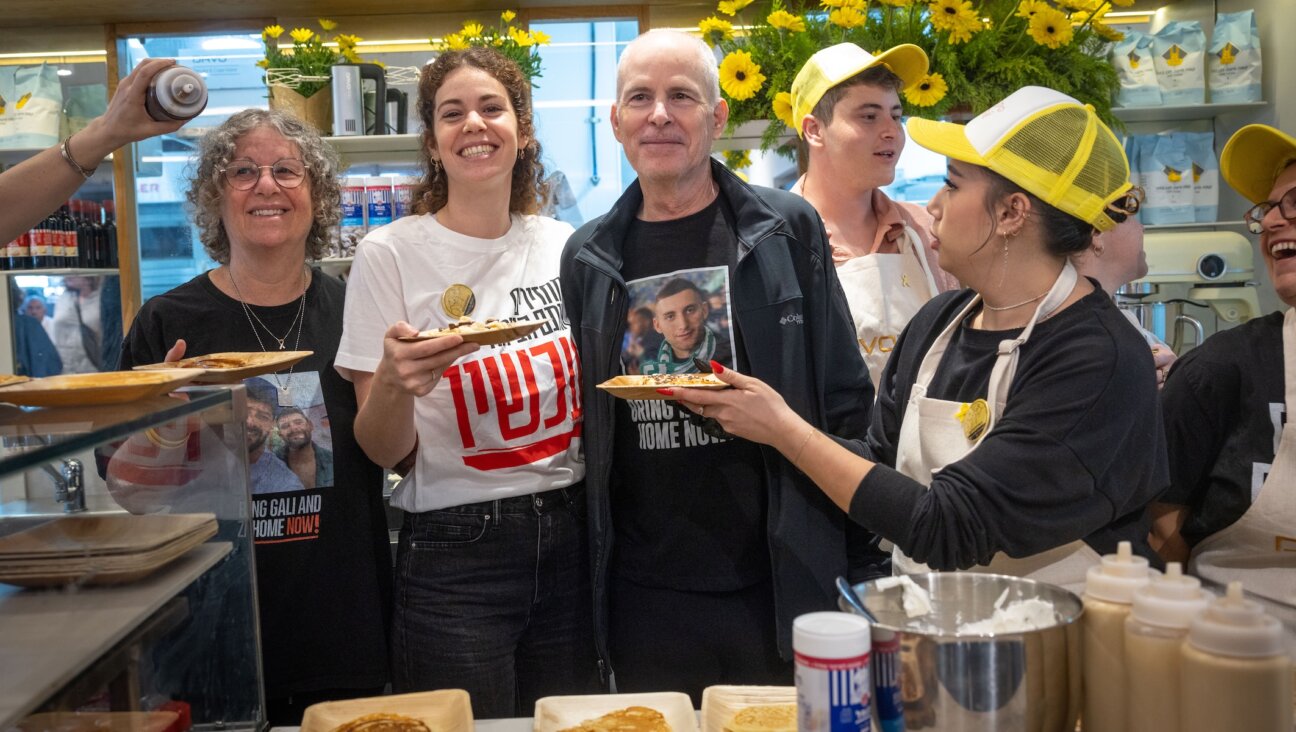‘Progressive’ Shmatte King, Sweatshop Foe, Faces Workers’ Protests Over Harassment
LOS ANGELES — Dov Charney, founder and CEO of American Apparel, has been hailed by Jewish anti-sweatshop activists as a pioneer in the fair treatment of garment workers in an industry plagued by allegations of substandard working conditions. But now his reputation is taking a hit with allegations of sexual harassment.
American Apparel, which set up operations in Los Angeles in 1997, is a garment manufacturer that has positioned itself as the brand of choice for T-shirts and other cotton goods worn by Gen X and Gen Y hipsters. In addition to the brand’s high quality, low prices and sexy image, its appeal lies in being a sweatshop-free clothing manufacturer. This year alone, the company expects to rake in profits of $250 million and will have stores in seven countries by year’s end.
At the helm of the company is Charney, a 37-year-old Montreal-born Jew whose wild man personality is as edgy as his clothes. An uninhibited, driven man, he doesn’t have much use for convention in regard to either his business or his sexuality.
Charney, who described himself to the Forward as “a Jewish hustler,” has spoken openly about having consensual sexual relationships at work and photographed American Apparel’s quasi-’70s porn-style ad campaigns himself. He now faces sexual-harassment lawsuits from three former female employees, who worked at the company in the creative and marketing departments for periods of nine month to nearly two years. Charney categorically denies all charges.
Regardless of the cases’ outcome, Los Angeles-based organizations such as the Progressive Jewish Alliance (which featured Charney in its “No Shvitz” anti-sweatshop book) and other anti-sweatshops activists worry that the public stain on Charney’s reputation will roll back support for the sweatshop reform for which American Apparel has been held up as an example. For anti-sweatshop activists who want to support fair labor practices but not at the expense of appearing to condone sexual harassment, this is a complex problem.
“If the current allegations against him are correct, it is a real shame because it will tarnish the good that he’s done,” said Progressive Jewish Alliance President Aryeh Cohen, who is also a professor at the University of Judaism. “Worker justice issues are a number of issues. Emotional abuse is just as much of a worker justice issue as living wages are. So if the sexual harassment suits, if those allegations are correct, then he’s not doing what he claims to be doing. The model is not what it was. It would be a shame, then, if other people point at him and say it can’t work.”
Sweatshop labor is a heated issue for Los Angeles activists, as the city leads the nation in the exploitation of primarily Latino and Asian immigrants, who are forced to produce clothing under illegal conditions and for slave wages. In contrast to this, Charney created a business model he calls “vertical integration,” in which all manufacturing, design and marketing is done under one roof, cutting down on expenses and controlling all the variables (different designer, production and marketing companies) that usually contribute to sweatshop practices in an effort to cut costs and corners. In controlling all of these elements in one shop, American Apparel has created the model for a wildly successful, sweat-free business — a company that produces its goods in America, and that pays its workers living wages and gives them such benefits as health insurance and English classes.
“We’ve been able to advance a business machinery that’s really a human kind of business machinery, that can produce products that people really love to wear,” Charney said. “We’re a capitalist company, but we try to be a good place to work.”
The company employs about 5,000 people. Despite some controversy over allegations — which he denies — that he tried to block his employees from unionizing in 2003, most anti-sweatshop activists have continued to highlight the company.
In an interview with the Forward, Charney was clearly furious over the civil court accusations against him. “The entire process of the entire sexual harassment machinery is capitalism and justice gone bad,” Charney said. “The impact of the lawsuits is too great, and there are no safeguards. In my opinion it is unconstitutional. They can make things up.”
Charney considers himself an artist and says that some of the allegations against him are the result of misinterpreting a modern, creative work environment and that he is being exploited because of his success and sexually open persona. The allegations against him include exposing himself to employees, using sexually offense language, asking female employees to masturbate with him and giving female employees vibrators.
“All of those things are false,” Charney said. “I never gave out sexual vibrators in my business, I never exposed myself to any of these parties, and I never had sexual intentions and I never invited anyone to masturbate with me as far as these three parties are concerned. But even then, is it illegal to ask someone to masturbate, or to say to an employee, ‘Hey, do you want to go to a hotel or motel and let’s f—k?’”
He defended himself against charges of exposure by joking, “I could pull my penis out right now, and I guarantee you no one would be offended.” As for any allegedly prurient language, he said, “The vernacular of the fashion industry should not be used as a device to extort money.”
Charney also drew parallels between himself and the case of writers from the now defunct NBC sitcom “Friends,” who were being sued by a former writer’s assistant for using sexually charged language in the writer’s room. “You have to be able to speak freely in a creative environment, or else creativity doesn’t really happen.”
The women making the accusations did not make themselves available to speak to the Forward, but the attorney for two of the women, famed feminist Gloria Allred, said in response to Charney’s denials, “I look forward to trying this case in court.”
Charney’s troubles appear to have started in July of last year, after Jane magazine published a profile of him in which the writer described a consensual sexual relationship she had with the American Apparel founder while reporting the story. Of the encounter, Charney will only say, “It was 4 a.m., and there was alcohol, and friendship and pleasure in the air.”
“The Jane article unfortunately may have laid the ground for these lawsuits,” Charney added. “And the unfortunate thing is had the business not been so successful, you wouldn’t have the interest of Jane magazine.” Still, Charney said, “I liken this all to homophobia. It’s sex phobia.”
“I wasn’t attracted to any of them,” Charney said of his accusers. “I’m an atheist, but I swear on the Torah, my bubbe, my zeyde, that I had one fantasy about these women. Want to hear it? I wanted to fire them all. I thought they were all lousy employees from the beginning.”
All the remarks and allegations set up a difficult position for anti-sweatshops activists who want to support Charney’s business model but not the man himself.
“If the allegations are right, it’s kind of tragic. It’s disappointing. Here was a model, a guy who was doing well by doing good, and he wasn’t doing so good if the allegations are right. It’s sad,” said Cohen, who never has met Charney. For now, though, the University of Judaism professor is taking a watchful stance. “We will wait and see what happens with these allegations,” Cohen said. “We don’t want to pre-judge. We’re actually pro-Bill of Rights, system of justice, innocent until proven guilty.”
The Forward is free to read, but it isn’t free to produce

I hope you appreciated this article. Before you go, I’d like to ask you to please support the Forward.
At a time when other newsrooms are closing or cutting back, the Forward has removed its paywall and invested additional resources to report on the ground from Israel and around the U.S. on the impact of the war, rising antisemitism and polarized discourse.
Readers like you make it all possible. We’ve started our Passover Fundraising Drive, and we need 1,800 readers like you to step up to support the Forward by April 21. Members of the Forward board are even matching the first 1,000 gifts, up to $70,000.
This is a great time to support independent Jewish journalism, because every dollar goes twice as far.
— Rachel Fishman Feddersen, Publisher and CEO
2X match on all Passover gifts!
Most Popular
- 1

Film & TV What Gal Gadot has said about the Israeli-Palestinian conflict
- 2

News A Jewish Republican and Muslim Democrat are suddenly in a tight race for a special seat in Congress
- 3

Fast Forward The NCAA men’s Final Four has 3 Jewish coaches
- 4

Culture How two Jewish names — Kohen and Mira — are dividing red and blue states
In Case You Missed It
-

Fast Forward Cory Booker proclaims, ‘Hineni’ — I am here — 19 hours into anti-Trump Senate speech
-

Opinion In Trump’s war against campus antisemitism, hate the tactics but don’t ignore the problem
-

Yiddish כ׳בענק נאָך די וועלטלעכע ייִדן וואָס האָבן אָפּגעריכט אַ טראַדיציאָנעלן סדר Longing for those secular Jews who led a traditional seder
מײַן פֿעטער יונה האָט נישט געהיט שבת און כּשרות אָבער בײַם אָפּריכטן דעם סדר האָט ער געקלונגען ווי אַ פֿרומער ייִד
-

Fast Forward Rabbi who left Harvard calls Trump threat ‘reasonable’ — but warns of looming consequences
-
Shop the Forward Store
100% of profits support our journalism
Republish This Story
Please read before republishing
We’re happy to make this story available to republish for free, unless it originated with JTA, Haaretz or another publication (as indicated on the article) and as long as you follow our guidelines.
You must comply with the following:
- Credit the Forward
- Retain our pixel
- Preserve our canonical link in Google search
- Add a noindex tag in Google search
See our full guidelines for more information, and this guide for detail about canonical URLs.
To republish, copy the HTML by clicking on the yellow button to the right; it includes our tracking pixel, all paragraph styles and hyperlinks, the author byline and credit to the Forward. It does not include images; to avoid copyright violations, you must add them manually, following our guidelines. Please email us at [email protected], subject line “republish,” with any questions or to let us know what stories you’re picking up.














